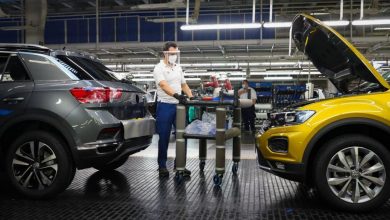
Coronavirus auto latest: Pendragon takes protective measures against virus
Here, Motor Finance will be collating all of the latest news coming out of the industry with regards to the impact of coronavirus (COVID-19):
18 March
Pendragon takes protective measures against coronavirus
To combat the effects of coronavirus, car dealership group Pendragon has taken some additional protective measures.
These include deferring commitments in its capital expenditure programme, increasing the flexibility in marketing spend, closely monitoring inventory levels and developing alternating work schedules and home-working options for employees.
Pendragon said it is has seen minimal impact on business due to the virus, but is closely monitoring the evolution of COVID-19.
The group noted that its new vehicles are predominantly sourced from the EU and UK. Although some manufacturers have announced short-term shutdowns to their production facilities, Pendragon understands that most OEMs have inventory buffers of several months. Therefore, the group does not anticipate its supply of new vehicles to be significantly disrupted before autumn 2020.
Pendragon also acknowledged the potential impact on consumer shopping habits in the UK. “Most of our new car sales and a substantial proportion of used car sales are made through a Purchase Car Plan or similar arrangement which provides an incentive to customers to change their vehicle at the expiry of the arrangement.
“Consumers can purchase both new and used cars with associated finance over the telephone or internet without visiting dealerships. We also offer vehicle delivery to the customer’s chosen destination. This provides underpinning for vehicle sales, although if the situation worsens, we anticipate there may be some level of deferral.”
The company said it has modelled the impact of a severe reduction in vehicle sales over a sustained period on our financial covenants and bank facility limits and remains comfortable that it is well-positioned, with mitigants available in the more severe scenarios where headroom becomes more limited.
Bill Berman, chief executive of Pendragon, said: “2019 was a year of transition for the Group that played out against challenging market conditions, however, we returned to profitable growth in the second half and this provides us with a solid platform for the coming year. At the moment, we are closely monitoring the impact of COVID-19 on the economy as the situation continues to develop.”
17 March
Government announces £330bn loan package for UK businesses
Chancellor Rishi Sunak has committed £330bn, equivalent to 15% of UK GDP, of government loans to UK businesses to combat the effects of coronavirus.
“The government will stand behind businesses, small and large,” said the Chancellor in a speech. “Any business that needs access to cash to pay their rent, their salaries, suppliers, or purchase stock, will be able to access a government loan or credit on attractive terms.
“If demand is greater than the initial £330bn I’m making available today, I will go further and provide as much capacity as required.”
The support will be offered through two main schemes: to support liquidity among larger firms, there will be a new lender facility with the Bank of England, providing low-cost, accessible commercial paper.
For small and medium-sized businesses, the government is extending the business interruption loan scheme, announced in the Budget last week. Rather than loans of £1.2m, the scheme will now provide loans of up to £5m with no interest due for the first six months.
Both of these schemes will be available from the start of next week.
Commenting on the new measures, Mike Hawes, chief executive of the SMMT, said: “We welcome the additional and significant emergency support for business announced by the Chancellor today. The UK automotive industry is inherently strong and globally competitive but now stands on the precipice and will urgently need extraordinary measures such as these to avoid falling over the edge.
“We are already seeing plant closures as global demand falls and supply chains are stretched. The continued success of this industry is critical not just to the country’s economic performance but also to the hundreds of thousands of people across the country who rely on the sector for their livelihoods.”
Government seeks automakers’ help with health equipment production
The UK government has asked manufacturers, including automakers Ford and Honda plus aircraft jet engine maker Rolls Royce, to help make health equipment including ventilators to cope with the coronavirus outbreak.
It has also asked British construction equipment maker JCB if it could transfer some of its skills to ventilator production as the coronavirus pandemic increasingly concentrates European governments’ minds
According to Reuters, the British government announced it was ramping up its battle against the coronavirus outbreak, shutting down social life and ordering the most vulnerable to isolate themselves for 12 weeks.
Prime minister Boris Johnson had spoken to over 60 manufacturing businesses and organisations to ask them to help step up the production of “vital medical equipment” such as ventilators for the National Health Service, a spokeswoman for his Downing Street office told Reuters.
“The prime minister made clear responding to coronavirus and reducing the spread of the peak requires a national effort,” the spokeswoman told the news agency.
“He asked manufacturers to rise to this immediate challenge by offering skills and expertise as well as manufacturing the components themselves. Businesses can get involved in any part of the process: design, procurement, assembly, testing, and shipping.”
Hotels will be used as emergency hospitals, retired doctors are being asked to come back to work and some elective surgery is being canceled.
Health Secretary Matt Hancock said there had been an enthusiastic response to the call for British ventilator production.
“We will buy as many ventilators as are made,” he later told parliament, Reuters reported. “It is not a question of putting a target on it, we are just going after as many as we possibly can.”
NFDA urges government support for automotive retailers
The National Franchised Dealers Association (NFDA) has written a letter to Chancellor of the Exchequer Rishi Sunak to urge the government to support franchised retailers during the outbreak of coronavirus.
The NFDA is concerned that government support is currently only targeting one group of businesses – SMEs. Franchised vehicle retailers pay very high levels of business rates and operate on much tighter margins than most SMEs, with an inherent high fixed cost exposure including rent, business rates, VAT and wages.
As a result, NFDA recommends that:
- Temporary business rates relief be extended to all retail businesses, regardless of their rate bill
- The British Business Bank be authorised to extend the Coronavirus Business Interruption Loan Scheme to any retail business, regardless of size
- Statutory Sick Pay (due to Coronavirus) relief should be provided for the first two weeks to all retail businesses, regardless of size.
Sue Robinson, director of the NFDA, said: “The retail automotive sector employs 590,000 people in the UK and businesses must be protected through supportive fiscal measures during the outbreak of the Coronavirus.
“The impact of the virus is going to be felt across every part of the economy and especially in the retail sector. Revenues from vehicle sales and services will not only be impacted by the introduction of social distancing measures, but also by the widespread shutdown of European car and parts manufacturing.
“There is a real danger that if the Government is only targeting support at one group of businesses (SMEs), some big businesses will fail, causing business interruption in any case for SMEs that contract with them. The automotive retail sector needs to be protected regardless of size.”
Volkswagen to suspend production at European plants
Volkswagen Group has outlined plans to suspend production at its manufacturing plants in Italy, Portugal, Slovakia and Spain this week.
Other VW factories around Europe are also preparing to shut down due to the spread of coronavirus. The company said in a statement that it is uncertain how long the coronavirus will affect the group, and “it is almost impossible to make a reliable forecast”.
Herbert Diess, chief executive of VW, said: “Given the present significant deterioration in the sales situation and the heightened uncertainty regarding parts supplies to our plants, production is to be suspended in the near future at factories operated by group brands.
“2020 will be a very difficult year. The corona pandemic presents us with unknown operational and financial challenges. At the same time, there are concerns about sustained economic impacts.”
Motor dealers facing ‘rent crisis’ in face of COVID-19
Car dealers are facing a rent crisis as the coronavirus continues to spread around the world, with automotive consultant Accendia advising dealers to engage with their landlords over potential rent arrears.
“Dealer groups and OEMs need to implement an emergency rental strategy now to mitigate the impact of coronavirus as consumers are put off unnecessary purchases,” said Accendia.
“Buying a new car will be among the first retail casualties as consumers follow government advice to stay home and limit social contact. For a sector already grappling with falling registrations and lean margins, the effect could be catastrophic for smaller groups and single-site operators.”
UK dealerships should engage with landlords as soon as possible to structure a temporary agreement in respect of forthcoming rental obligations, said Accendia.
Richard Adams, director of Accendia, added: “Several retail clients have approached us to ask what can be done to keep cash in the business and it seems to us that early intervention, by approaching landlords immediately, would be prudent. Many landlords will be expecting an approach and should recognise that properly constructed solutions will benefit landlord and tenant alike.”
General Motors offers 0% financing to spur sales
In the US, General Motors and Ford Motor have launched a range of new vehicle financing options to encourage sales amid the outbreak of coronavirus.
Through the company’s GM Financial arm, General Motors is offers 0% financing for seven years, and four months deferred payments for those with an A+ credit rating.
“We wanted to reassure customers that we’re here for them and our dealers are here for them,” said GM spokesperson Jim Cain. “We’ve never done this combination before.”
Such measures could soon be deployed in the UK, as COVID-19 looks set to severely impact consumer confidence and dealer footfall.
16 March
Groupe PSA closes European plants
French car manufacturer Groupe PSA, owner of Peugeot and Vauxhall, will be closing its plants across Europe yo prevent the spread of coronavirus.
A statement from the company read:
“Due to the acceleration observed in recent days of serious COVID-19 cases close to certain production sites, supply disruptions from major suppliers, as well as the sudden decline in the automobile markets, the Chairman of the Executive Board with the members of the crisis unit, decided the principle of the closure of the vehicle production sites, according to the following schedule and until March 27.
March 16: Mulhouse (France), Madrid (Spain)
March 17: Poissy, Rennes, Sochaux (France), Zaragoza (Spain), Eisenach, Rüsselsheim (Germany), Ellesmere Port (United Kingdom), Gliwice (Poland)
March 18: Hordain (France), Vigo (Spain), Mangualde (Portugal)
March 19: Luton (United Kingdom), Trnava (Slovakia)
“Groupe PSA remind that until then, compliance with the barrier measures, going beyond the recommendations of the health authorities on the sites, are the best protection to prevent the spread of the virus.”
Online sales could be ‘lifeline to disrupted dealers’
Online sales could provide a lifeline to car, van and motorcycle dealers whose business will be disrupted by coronavirus, according to iVendi.
James Tew, chief executive officer, said that online could still provide an effective route to market in the event of consumers avoiding showrooms. “We’re raising this subject with all due sensitivity, but, in the event that footfall to dealerships falls dramatically, businesses need to find a way to keep functioning as normally as possible. Moving more sales online is a potential solution.
“There is a potential parallel to the existing situation. We know that when people are sitting at home for extended periods, they shop online. Every year, across Christmas and New Year, usage of our platforms increases dramatically.
“Now, we’re not glibly suggesting that a pandemic is the same as a public holiday. It’s not. But there are lessons to draw. People with money to spend may well want to shop for a car, van or motorcycle at the most unlikely times.”
Step one for dealers would be to maximise their online presence, said Tew, while step two would be to consider how the fulfilment side of the business would work.
“Really, this is the time to ensure that, in terms of the online motor retail facilities that you offer, you have your house fully in order. Effectively, you need to be able to allow the customer to choose and finance their car online as a minimum.
“Then, you have to look at which aspects of the deal can be handled remotely that are currently undertaken on a human level. For example, can you put a process in place where someone can show you their part exchange via their mobile phone – for example, through a Facetime call?”
Tew added that he was confident that iVendi would continue to operate on a business-as-usual basis while the coronavirus situation followed its course.
“Effectively, we were designed from our launch a decade ago to be a 21st century mobile business, so in the event of any restriction on movement of people by the government, our entire team will be able to work from home and there should be no disruption to any aspect of our service provision to dealers and other customers.
“In the meantime, we are following all official advice in terms of personal and office hygiene, keeping an eye on staff for signs of coronavirus and also minimising travel where necessary. It is about putting the health of people first.”
12 March
Car market forecasts likely to be revised as public health crisis deepens
Following news that car sales in China plunged 80% in February due to the impact of measures to tackle the coronavirus (Covid-19);
David Leggett, automotive editor at GlobalData, offers his view: “There are signs that attention in the auto industry is shifting away from tackling immediate supply chain disruption towards the prospect of much lower demand through 2020.
“China’s 80% market decline in February is a stark warning of the potential for lost sales in the global automotive market in the months ahead. Forecasts for car markets are likely to be revised down as the public health crisis deepens – especially in Europe and North America.
“Vehicle manufacturers and suppliers alike will be anxious over the duration of the expected coronavirus impacted market downturn and the speed of recovery later in the year. Even without the added impact of the Covid-19 pandemic, the global vehicle market was heading for a decline of around 2% this year with the US, China and European markets flat or slightly declining.
“The demand outlook has now deteriorated further.
“If the global vehicle market decline in 2020 is nearer 10%, that will inevitably result in much lower earnings for automotive companies, many of whom are experiencing rising cost pressures formed by the necessity to invest in expensive technologies such as electrification. Indeed, the new stronger headwinds on the global car market come as they face the burden of much tighter regulatory hurdles on CO2, especially in Europe.
“While welcome signs of a nascent recovery to activity have been evident in China in recent weeks, the rest of the world is still very much heading into an economic downturn of uncertain depth and duration. Automotive companies will be especially nervous.”
11 March
Budget 2020: industry reaction
Paul Burgess, chief executive of Startline Motor Finance, said: “It’s extremely welcome that the Government has unveiled a range of measures designed to protect the economy but really, the used car market over the next few months will depend very much on the spread of coronavirus in the UK and how the public react.
“It is noteworthy that the Government is now saying that the impact on the country will be ‘significant’. Certainly, it seems probable that people who are working from home and generally curbing their travel are probably going to be less likely to change their car, whatever steps are taken to protect businesses. There are simply a lot of unknowns.
“However, the longer-term investments that the Government are making are to be welcomed, especially in roads and EVs. Coming out of the other end of the coronavirus crisis, the economy will need boosting in the medium-long term, especially as we settle into a post-Brexit scenario, and it looks as though borrowing will be taking place to make that happen.”
Phil Jerome, managing director of Meridian Vehicle Solutions, said: “The shadow of coronavirus looms large over this Budget. It is probably not the financial plan that the Government planned to deliver even a few weeks ago but they have shown, with the wide range of mitigating measures that have been introduced, that they are taking the economic aspect of the threat of epidemic seriously.”
Mike Hawes, chief executive of the SMMT, said: “Unprecedented situations call for unprecedented measures so today’s emergency funding and wider measures to support businesses and workers in managing the likely effects of coronavirus is very welcome.”
Font: Verdict





